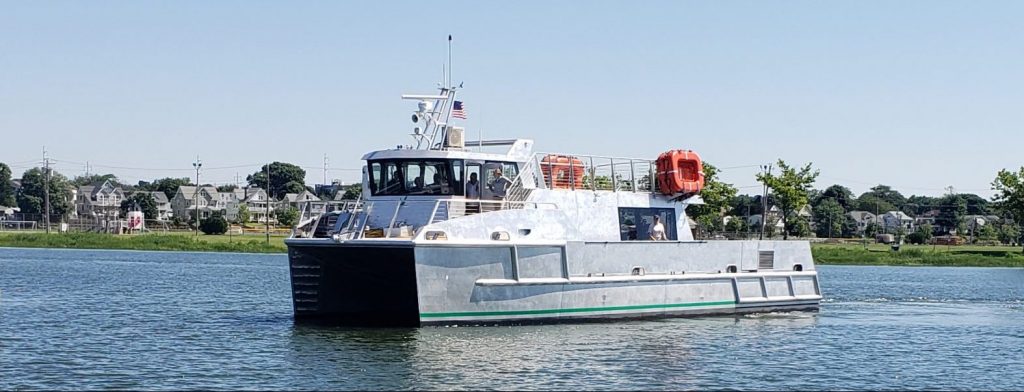
Core Assurance CR Marine Insures Hybrid Catamaran, Among the First Built in U.S.
August 12, 2019
Building a Maritime Highway Across the Long Island Sound
Owners of one of the first hybrid cargo vessels ever built hope to develop a shipping route from Connecticut to Long Island, easing truck traffic on congested roadways. (Source: The New York Times)
Anyone who has driven on I-95 through Connecticut or on the Long Island Expressway has experienced the heavy traffic and congestion. What if there were a way to reduce delays by diverting cargo and transporting it by boat across the Long Island Sound – a sort of marine highway – instead?
Robert Kunkel, a retired marine engineer, is trying to do just that.
He will soon start a freight ferry service, called Harbor Harvest, which is named for an artisanal grocery store and cafe in Norwalk, Conn., that he has run with his wife, Marilyn, since 2015.
The concept is simple. An environmentally friendly boat will haul locally made products and other cargo between Norwalk and Huntington, N.Y., on Long Island. At both locations, Harbor Harvest warehouses will store the goods and serve as pickup points.
Besides carrying its own freight for resale, Harbor Harvest will also transport goods for other companies, perhaps even small packages.
This service, to begin in a couple of weeks, will be cheaper, quicker and greener than trucking, according to Mr. Kunkel.
“We want to bring back regional waterborne transportation at a reasonable cost to areas that want locally produced food,” said Mr. Kunkel, who also operates a ship design and construction management firm.
The culinary cargo will range from Connecticut beef to Long Island craft beer and wine.
The project is poised to receive $1.8 million in federal grant money. But whether the green effort will be economically viable is another question, said Brent Dibner, president of Dibner Maritime Associates LLC in Brookline, Mass., a marine industry management consulting firm.
“There has been a long trail of good intentions that have fallen on the sword of economic reality,” Mr. Dibner said.
The New York City Economic Development Corporation has also shown interest in the marine highway concept. Its Freight NYC initiative has proposed building a $25 million marine terminal on the East River for suppliers serving the Hunts Point Produce Market in the Bronx, said Andrew Genn, the senior vice president of ports and terminals for the organization.
“We support marine highway investments so far as they can reduce highway congestion in New York City,” Mr. Genn said.
Harbor Harvest is fundamentally different from most earlier, federally backed water transport efforts that focused on delivering large loads housed in shipping containers, and failed, Mr. Kunkel said. Harbor Harvest will transport small quantities of goods, much of it perishable, in a new $2.8 million, 65-foot aluminum catamaran.
Named Captain Ben Moore, the boat will be able to cross the sound in about 45 minutes, Mr. Kunkel said, adding that it would take a truck at least twice that long to drive between the same points.
A two-member crew will operate the Captain Ben Moore, which is believed to be among the first hybrid cargo vessels built in the United States. The boat’s electric hybrid engine will run on batteries. Shore-side power units, located on piers near each of the Harbor Harvest warehouses, will recharge the boat’s batteries between trips.
Mr. Kunkel said he was committed to running the service for at least 24 months. But he expects it to generate a profit before that.
To make that happen, in addition to reselling goods through its retail centers, Harbor Harvest will act as an intermediary for other shipping companies like the North-Carolina based Old Dominion Freight Line, which will send its trucks to Connecticut and Long Island to pick up goods once they have crossed the sound.
Some local companies, such as Fossil Farms, a natural meat company in Boonton, N.J., are planning to use Harbor Harvest as a distributor to expand its market.
Larry Penner, a transportation historian and a former program manager for the Federal Transit Administration, called the project “intriguing and worthwhile” because it did not involve building a tunnel or a bridge across Long Island Sound. “It could pay big dividends,” he said.
A grant from the Transportation Department’s Maritime Administration should help defray the cost of building a second, sister boat and buying loading equipment, Mr. Kunkel said. (Those receiving marine highway grants are obligated to use the funds to expand services, not to cover start-up costs.)
It is possible that the second Harbor Harvest boat will deliver goods to Hunts Point, or the new ferry terminal and boat basin at Garvies Point in Glen Cove, N.Y., Mr. Kunkel said. He has also received queries about providing service between Norwalk and 125th Street in Manhattan, or to Red Hook in Brooklyn.
If successful, the shipping initiative could be the beginning of a bolder movement to reduce congestion and pollution, said Mark H. Buzby, administrator of the United States Maritime Administration, which has been instrumental in identifying new water routes and providing startup capital to efforts like Harbor Harvest.
“America’s inland waterways can and should again be a national economic asset and an integrated part of the nation’s broader transportation system,” Mr. Buzby said.

